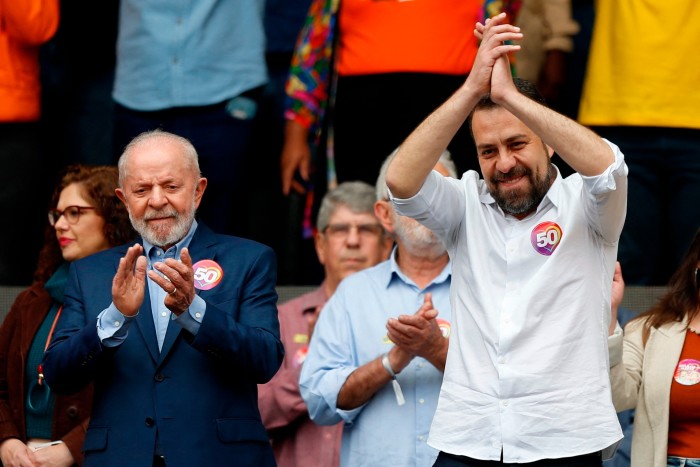
Even by the acrimonious standards of Brazilian politics, the race for the mayoralty of São Paulo has stood out. It began with accusations from Pablo Marçal, a populist outsider, that other candidates were snorting cocaine. Then his two most popular rivals opted out of a much-anticipated debate.
But in recent days the race to run the western hemisphere’s largest city has plumbed new depths. Marçal — a rightwing self-help guru and influencer who has taken the election by storm — was hit with a chair and reportedly injured on Sunday by outside contender José Luiz Datena during a live TV broadcast.
Marçal filed a police complaint, but Datena was unrepentant. “Marçal has shown that he is a threat to the city,” said the famous television host turned political hopeful. “He needed to be held to account.”
Marçal, 37, has shaken up Brazilian politics since he crashed on to the national stage just weeks ago with his mix of savvy social media marketing, unabashed showmanship and outlandish campaign pledges, which even he admits are just “dreams for the city”.
Despite not yet winning the endorsement of Jair Bolsonaro — the former president and political godfather of Brazil’s populist right — Marçal is a serious contender to win São Paulo when voters go to the polls next month for an expected two-round election.
As a populist keen to invoke religion and sworn to oppose the existing system, Marçal is frequently compared to Bolsonaro, despite strains in the relationship between the two men.
Among the businessman’s proposals are the construction of the world’s tallest skyscraper, with a height of 1km, as well as a cable car network to connect poorer outlying communities.
Often sporting a baseball cap with an “M” logo, Marçal has pledged to triple municipal police officers, turn empty properties into affordable homes and teach entrepreneurship in city schools.
“I have no television time, no political godfather, no political coalition because I didn’t want to sell my soul to these guys,” he said in an Instagram video. “I arrived here with a cell phone, the people and God.”
His closest competitors are the incumbent, Ricardo Nunes, a centre-right politician widely seen as the establishment candidate, and Guilherme Boulos, a leftwing lawmaker and former housing activist who many see as a potential future leader of Brazil’s left, currently headed by President Luiz Inácio Lula da Silva.
“Marçal fits a role that is very much in vogue in Brazilian politics, which is the anti-establishment candidate,” said Eduardo Mello, a professor of politics at the Getulio Vargas Foundation.
“There are a lot of voters who are disillusioned with the political class, with the established institutions. And they hunger for someone who is really interested in tearing it all to the ground.”

The clamour, however, has overshadowed many of the pressing problems in the city of 11.5mn, from creaking public transport and rough sleeping to crime and drug addiction.
With millions of followers on Instagram, Marçal pitches simultaneously to Brazil’s growing evangelical population, with a message of God and family, and the country’s urban poor, through advice on how to get rich.
“I think [Marçal] has already won the election,” said Jonas Walklys, a 20- year-old fruit seller who lives in a deprived neighbourhood on the city’s outskirts. “He came from nothing, built his own wealth and has gone into politics to follow a calling.”
Marçal has declared his assets at about $30mn and regularly touts his success in business. His team describes him as a “multi-entrepreneur of a multibillion-dollar conglomerate, covering 19 sectors, including real estate, education, insurance, among others”.
But he has also been the subject of multiple police inquiries and in 2010 was sentenced to four years in jail for qualified theft, a crime considered more serious than simple “theft” under Brazilian law because of the circumstances of the offence. He never served the sentence, however, because of wrangling over the appeals process. Prosecutors had accused him of being part of a group that was involved in banking fraud. Marçal denies any wrongdoing.
He also has been accused of endangering the lives of dozens of participants in his self-help groups when he took them hiking in bad weather in early 2022. They had to be rescued by firefighters. Marçal has also denied wrongdoing over that incident.
“His popularity is related to the identification of voters, especially men, with his success,” said Camila Rocha de Oliveira, a political scientist at the Brazilian Center for Analysis and Planning.
“Marçal always talks about being the son of a cleaning lady, who went to public school and became a millionaire. Now he wants to teach poor people to prosper like him.
“In addition, his use of social media is very intense. He’s a professional influencer who went into politics. This makes a huge difference.”
The controversies surrounding Marçal have drawn wide attention to his campaign. But the influencer suffers from a high rejection rate and at least 44 per cent of paulistanos say they would not vote for him under any circumstances, according to Datafolha.
He is an “agent of chaos”, said Camila Santos, a lawyer in her 30s. “His madness is calculated [to win votes]. I will vote for Guilherme Boulos, mainly because of his proposals regarding health and education.”
Despite the lack of buzz around his campaign, Nunes is a quiet favourite among many pundits to win. As incumbent he has greater control over electoral resources; his party, the Brazilian Democratic Movement, is a well-oiled political machine, and Nunes has at least the nominal support of Bolsonaro, who left office last year and remains popular.
“Nunes is the candidate of the old clientelistic establishment. He’s not an ideologue,” said Mello.
The other leading contender is the leftwing Boulos, who has sought to steer his campaign to the centre in recent weeks. Centre-right parties have traditionally dominated the city’s elections, although Lula’s Workers’ party, which is backing the Boulos campaign, has won the mayoralty twice since 2000.
“Without a doubt, the main issue — both today and historically — is social inequality. It is an open wound in the richest city in Latin America. In some poorer neighbourhoods, life expectancy can be almost 20 years lower than in the richer neighbourhoods,” Boulos told the Financial Times.
A Real Time Big Data poll this week after the chair incident gave Nunes 24 per cent support, Marçal 22 per cent and Boulos 22 per cent. The first round of voting will be on October 6. If no candidate wins more than 50 per cent, a run-off will take place on October 27.
For Walklys, the fruit seller, there was no doubt about the outcome: “What’s broken in our country is the system,” he said. “God is with [Marçal] — and he will fix the system.”
Additional reporting by Beatriz Langella